#-can have a parallel drawn to how men feel entitled to women
Explore tagged Tumblr posts
Text
Listen. Listen. Carmine from Pokemon as a lesbian makes so much sense if you look at the narrative through that lens. I have so much to say on this topic but I do not post my actual character analysis on my blog that isn't long rambling tags on preexisting posts. I know it is not the intended approach for the character, especially given how there's no difference in character or dialogue between whether you have a female player character or not, but an interpretation is just that, an interpretation, and therefore does not need to rely solely on authorial intent to draw wider conclusions. I Love You Carmine Pokemon .
#shes so fun i luv her... easily up there for one of my top favorite characters#really encapsulates the energy of 'angry closeted teenage lesbian'#anyways my more 'out-there' part of my 'Carmine is a lesbian' interpretation is how Kieran's insistence that he is entitled to Ogerpon-#-can have a parallel drawn to how men feel entitled to women#obviously. again. not intended. but like his jealousy over Carmine's relationship with the player-#-and Carmine only just now realizing something as important as her own sexuality BECAUSE of that relationship...#it could be so interesting. do you hear me.#Kieran mad at her for feeling as though she 'stole' the player away from him while-#-this is something so sensitive to Carmine as a whole. Do You Hear Me.#WHATEVAR i care too much about this#maybe one day ill finish my essay on it...#anyways can you tell im watching the gdq run LOL
3 notes
·
View notes
Text
RWBY and Masculinity
I love RT’s, and specifically RWBY’s take on masculinity so much. The show subverts all expectations wrt their male characters and their development, which is why the male viewers experience major cognitive dissonance between what they expect and what story is actually being told (and then have the gall to call it bad writing). Under cut because this has gotten so long so fast.
The two main male characters - Sun and Jaune - are subvertions of genre/medium staples.
Jaune specifically hits all the beats of the typical male self-insert in a harem anime: he’s catapulted into a world he knows nothing of, instantly establishes 3 different dynamics with 3 different female characters/archetypes - Cheery, Ice Princess and Hot Tall and Earnest - one of whom he immediately sets his eyes on, he’s surrounded by women that are a whole lot more powerful than he is (and arguably THE most powerful one is instantly drawn to him), he’s essentially powerless and dealing with self-esteem issues and is nondescript enough to be a vehicle for any male viewer to project themselves onto. Which is why you have a good chunk of Jaune’s fandom from V1 being the embodiment of the Venn diagram intersection bewteen weebs and incels like That, and why there’s so much harem fanfic revolving around Jaune.
CRWBY have heavily drawn from anime when making rwby so I don’t think this was coincidental; they laid out the groundworks to subvert a specific trope. Male fans, however, bought into the facade and kept waiting for Jaune to essentially steal the spotlight, be the focal point of several love interests and get a power up that’ll let him be their own power fantasy to boot, but CRWBY took his character in the very opposite direction.
Jaune makes a lot of mistakes but what defines him is how earnestly he learns from them and redeems himself. He apologizes for lashing out at Pyrrha as a result of his own feelings of inadequacy and powerlessness when bullied by Cardin and then accepts her offer to teach him, sincerely taking instruction from her and then taking inspiration from her strength. Once he realizes his seduction skit with Weiss is not only ridiculous but wrong, he instantly changes his approach and prioritizes Weiss’s wants and needs over his, giving her space and knocking sense into Neptune so that Weiss can have her “ideal” date. Jaune doesn’t get embittered about being essentially rejected and most importantly he doesn’t let it affect his relationship with Weiss. Both of them become actual friends from that point on, and we get to see Jaune develop a certain measure of emotional intelligence starting that moment, which becomes part of his skillset and is shown to be part of what makes him a good leader. One of the best examples is how he and Ruby team up in V6E1 to get the hunter on the train to turn the turrets off. Jaune heals the hunter’s wounded arm and gently assuages his fear, in clear contrast with Qrow abrasively manhalding an injured and panicked man and expecting him to comply. The writing essentially puts down the show of arms and props up Ruby and Jaune’s approach; Jaune specifically is the example of masculine leadership the writing looks favorably on.
And that’s the kicker here: Jaune’s strength comes from his set of soft skills as opposed to traditionally portrayed masculine strength, which usually careens into toxic power fantasy land. His whole arc in V1-3 is about learning to shed any distorted notions of chivalry and strength and knowing that his end goal shouldn’t be to become a hero for the sake of it or to live up to societal expectations, but to do what he can and as good as he can for the sake of everyone. Jaune is a good strategist and he knows how to make the best out of everyone’s powers. He’s there to enhance how people use their semblances together. His big power-up, his semblance reveal is basically him getting confirmed for a cross between a cleric and a paladdin (DnD players amongst us please correct me if I’m wrong): he is the ultimate support, acting as a healer and an amplifier to everyone around him, and that’s why he’s a good leader. His power on his own loses its entire meaning: Jaune takes strength from the people he loves and endlessly, earnestly gives back to them, never once stealing the spotlight in combat because that’s not his role and that’s okay.
And as for Jaune’s romantic prospects, think Forever Fall established once and for all that Jaune’s already found the One and I don’t think we’ll see him get any other love interest, especially now that arkos parallels oz/salem and with how vehement CRWBY are about lancaster being platonic.
Now Sun. I want to tackle a specific expectation I’ve seen from male fans and that’s about him becoming more significant to the plot by coleading/leading the new White Fang movement...which would be hijacking Blake’s storyline. Blake is the one with drive and a cause, she was literally born inside the movement and has since seen it get derailed AND was the one to reclaim it from Adam and give it a new vision, as opposed to Sun who apparently wasn’t even aware of the systematic oppression Faunus had to deal with on a daily basis outside of Vacuo. So why is Sun, who has exactly 0 qualifications for this job and no interest in it, still expected to get it by a good chunk of his fans? Aside from the pervasive misogyny permeating fandom culture, there’s a specific trope media has served to us for decades now and that’s of a Semi-Competent Male Hero with his Hyper-Competent Female Side-kick (Vox published an article about it a few years ago and I really recommend checking it out), where a male character who’s semi good at best and not nearly as well-versed into whatever field he shares with his infinitely more competent female sidekick somehow walks in and saves the day and most of the time the female sidekick also, unsurprisingly doubles as a love interest. Time and again, male characters get rewarded for being half as good as their female counterpart at best AND they get the girl most often than not.
But Sun’s whole character is, again, the very opposite of this. Sun never outweighs Blake on her own narrative (as is literal common sense) and shouldn’t be expected to. Sun actually gets schooled into the Faunus cause by his more competent female counterpart, Blake acting as his mentor and introducing him to the fight and why it matters. Blake and Sun basically reenact the plotline of Journey to the West (Sun quite literally references it by calling it a “Journey to the East”) a story whose main character is the legendary monkey king Sun Wukong, who’s the mythical figure Sun’s based on. Sun’s arc about finally knowing the cause and fighting for the right reasons happens thanks to Blake’s guidance - which Sun earnestly complies with and never questions because he knows she’s the expert and he doesn’t usurp that spot from her - and never overshadows her own narrative. Quite the opposite, it builds up to her own arc as a future leading figure of the WF and face of the Faunus cause by having her politicize someone who has no real stakes in this fight even though they should have.
And then even his endeavor with Blake as a love interest falls through, with their relationship getting entirely recontextualized in V4-5 where their dynamic gets rebuilt as a friendship. Incidentally, that’s when it finally starts actually developing, instead of being stuck in the V1-3 limbo of mutual fleeting attraction where they’re constantly missing each other’s cues because they literally do not understand each other on a fundamental level. V4-5 is when Blake understands Sun isn’t what she needs in a romantic partner, but she does need him as a friend and ally. And Sun, whose premise falls in line with the Nice Guy trope, actually subverts it: he never makes Blake’s emotional journey about him, never expects anything in return and gracefully bows out of the narrative (for the time being) without ever pressuring Blake into acknowledging or returning his feelings. He doesn’t agonize over the initial attraction not going anywhere and doesn’t expect to be rewarded for being a decent person; again Blake’s feelings and well-being are his priority because that’s what good friends do. Their relationship developing into a steady friendship is never a point of conflict between them, and it’s actually lived as a positive event for both.
And then, to top it off, CRWBY parsed together every bit of toxic masculinity and wrapped it into a power fantasy package and named the end result Adam Taurus, who’s the absolute worst abusive piece of shit. Adam is every single thing bad about men as a power structure: abrasive, entitled, controlling, takes violence as an indication of power and doesn’t take kindly to his leadership/vision being questionned. It’s not really coincidental that he steals the power seat from a woman and acts like he deserves it in any way. But male fans were so starved for their power fantasy fix and traditionally masculine cool calm collected and complicated male character that they were ready to minimize/outright ignore the abuse he’s put Blake through and just how awful a human being he was just to be able to hard project onto him. And CRWBY’s answer to that is basically this:

TL;DR: RT says if your masculinity isn’t humble, nurturing, supportive, compassionate, selfless and earnest then we don’t want it.
#rwby#my posts#jaune arc#sun wukong#me holding myself at gunpoint: why can't you say what you want in 5 sentences or less#my meta#@ incels watching rwby you've been bamboozled
2K notes
·
View notes
Text
A Discourse on Communication and Storytelling Part II: The Idealization of Nihilism
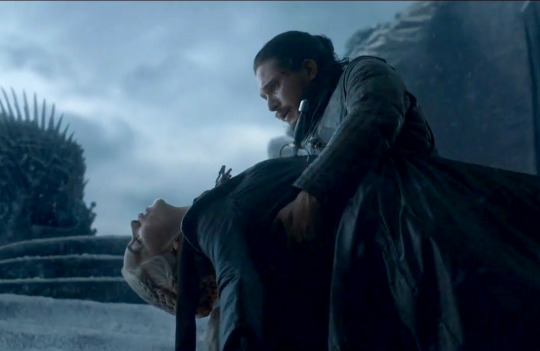
In my previous post, I outlined the flawed narrative structure of the conclusion of Game of Thrones. I focused primarily on Daenerys and how her story did not communicate effectively what Benioff and Weiss were wanting to accomplish with her, i.e. her becoming “Mad Queen” Targaryen. I then asked what it was that they did communicate through her story. Here is where I would like to begin.
As an artist and visual storyteller, I have become exceedingly grieved and disgusted with a lot of the stories in our entertainment today. Every one of my favorite shows one right after another ended in disappointment for me. I asked myself, why? Why were all these amazing shows, many of whom have exceptional talent working on them, crashing and burning, in my less than humble opinion? I believe the answer is multi-faceted, but I am going to zero in on one aspect for the sake of time and my argument. In short, cynicism and a nihilistic world view have poisoned the storytelling landscape.
I mean I get it. You only have to open your social media or major news page and you can find tons of reasons to bemoan the state of our society, our country, and the world. I understand the disappointment, the bitterness, the seething rage – I get it! I have felt it myself! I know precisely how everyone is feeling because I am feeling it too. I know that feeling of being utterly useless to help or stop any injustice or wrong from happening. The struggle is real.
However, the struggle is not all there is, and I believe that is the crucial thing to remember because something much more sinister than our own despair is happening, which is that we are coming to love our despair. Our bitterness and anger is becoming a part of how we are defining ourselves every day. Suddenly instead of these ideas and attitudes being recognized as the poison that they are, we drink it like it is sweet nectar. And to me that is exceedingly more grieving than feeling negative emotions in of themselves. We all feel negative emotions, we all feel the pain of life to one degree or another. This is a part of life, but to actually redefine and look upon those attitudes and thoughts as beneficial, glorious, and wise? That is the truly terrible thing.
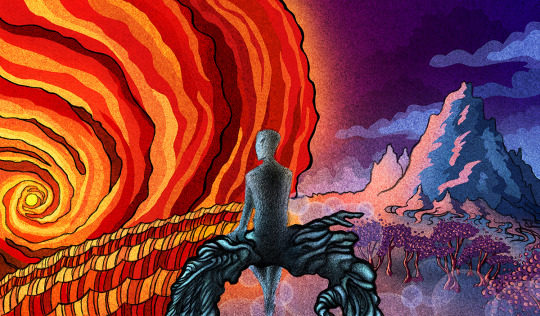
My own piece entitled: 美 which is the Chinese pictogram for “beauty”.
Now let us dig deeper into what I mean. If you recall from Game of Thrones Season 4 where Tyrion tells Jaime the story about their cousin Orson Lannister. He describes how in his simpleness, Orson would crush beetles all the day long, and Tyrion became obsessed with divining why Orson was doing this. He felt there had to be a reason, that there had to be some meaning behind what he was doing. Obviously, this story is an analogy. What Tyrion was really expressing was the aged old question, what does it all mean. I will paste the discussion below:
Tyrion: [...] In any case, I found nothing that illuminated the nature of Orson's affliction or the reason behind his relentless beetles slaughter. So I went back to the source. I may not have been able to speak with Orson, but I could observe him, watch him, the way men watch animals to come to a deeper understanding of their behavior. And as I watched, I became more and more sure of it: there was something happening there. His face was like the page of a book written in a language I didn't understand, but he wasn't mindless, he had his reasons. And I became possessed with knowing what they were. I began spending inordinate amounts of time watching him. I would eat my lunch in the garden, chewing my mutton to the music of "kun kun kun". And when I wasn't watching him, I was thinking about him. Father droned on about the family legacy and I thought about Orson's beetles. I read the histories of Targaryen conquests. Did I hear dragon wings? No, I heard "kun kun kun". And I still couldn't figure out why he was doing it. And I had to know because it was horrible, that all these beetles would be dying for no reason.
Jaime: Every day around the world, men, women, and children are murdered by the score. Who gives a dusty f*** about a bunch of beetles?
Tyrion: I know, I know, but still it filled me with dread. Piles and piles of them, years and years of them. How many countless living, crawling things smashed, dried out, and returned to the dirt? In my dreams, I found myself standing on a beach made of beetle husks stretching as far as the eye can see. I woke up, crying, weeping for their shattered little bodies. I tried to stop Orson once.
Jaime: He was twice your size.
Tyrion: He just pushed me aside with a "kun", kept on smashing. Every day. Until that mule kicked him in the chest and killed him. So what do you think? Why did he do it? What's it all about?
Jaime: I don't know.
This here is a perfect encapsulation of what I have observed in so many of our stories of late, stories which by their very nature are asking that aged old question, what does it all mean. Benioff and Weiss have just expressed it with a heavy hand here, while other writers and artists have a more subtle approach.
To make it clear what I am talking about, I want to draw a parallel between Tyrion’s story and what happened with Daenerys Targaryen. In this story, the audience is Tyrion – we are drawn to the story of Daenerys like Tyrion was drawn to the story of Orson. We were enraptured by her struggles as a character and divining the meaning of her story just as Tyrion sought to know the why of Orsen’s actions with the beetles. I mean isn’t that what we do as fans? We love going online and theorizing with other fans about what is going to happen, why it is going to happen, observing all the details of the plot and character arcs. We love seeking things out!
I cannot remember where I heard it, but it was in something I watched where they pointed out that audiences love to discover things on their own. They like being able to feel like they figured out something, that they found out something the writer had hidden or perhaps may not have been aware of. There is excitement in exploring the story, just as Tyrion was enthralled with understanding the truth and meaning behind Orson’s beetle slaughter. Yet what happened after all of Tyrion’s study, observations, ruminations, and questions? What happened to us the audience when we came to the end of Daenerys’ story? What happened to all that time and effort spent in watching, theorizing, and discussing? Despite Daenerys’ struggle as the underdog in her own story suffering abuse and pain - despite the awe of witnessing dragons coming to life from dormant eggs - despite all the lessons Daenerys learned as a ruler through her mistakes - all of it came to nothing. Just as Tyrion never divined the meaning behind Orson’s senseless slaughter, so we came to the end of Game of Thrones, having gained no beneficial understanding by our journey. Mad Queen Targaryen. Jon kills her. Orson gets killed by a mule. All the world burns. Beetles die for no reason. The End.
Tyrion: So what do you think? Why did he do it? What's it all about?
Jaime: I don't know.
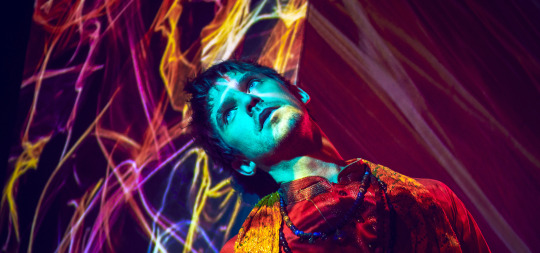
Game of Thrones isn’t the only show with these problems. In the FX show Legion, David Haller, the protagonist of the story, is suddenly twisted to become the show’s villain. He’s been Daenerys Targaryen-ed.
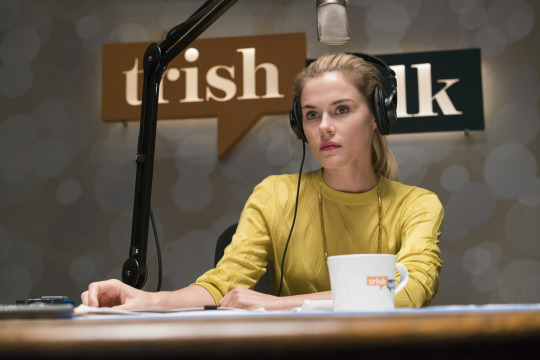
Trish Walker from Jessica Jones Season 3, also Daenerys Targaryen-ed.
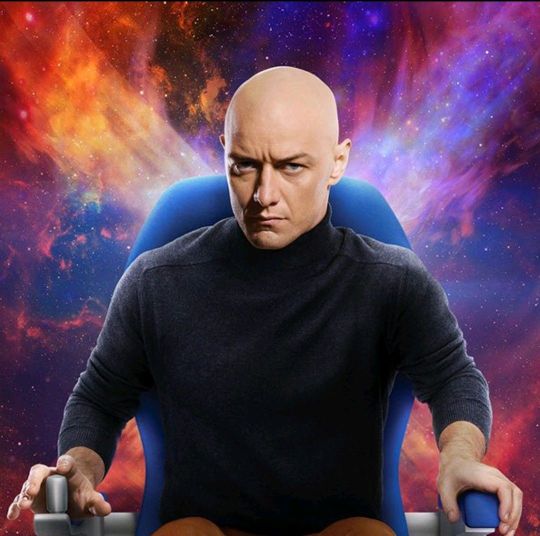
This one is from a movie (it isn’t only in tv shows) and it is a little more subtle, but Professor X in Dark Phoenix was suddenly twisted as this arrogant douche who was controlling and manipulative - the “idol” of the X-Men school brought low. The “idealistic delusion” of Professor X as a heroic leader unveiled to show us the true frailties underneath! *GASP*
As you can see within the very fabric of Benioff and Weiss’s writing, nihilism pervades. It isn’t just in Daenerys’ story, but scattered throughout the stories of Game of Thrones - i.e. how Jaime Lannister went from redemption story to dying under a pile of rocks. Yet not only is nihilism pervading, but it is being romanticized, like there is something profound and powerful in its telling - like we are achieving some enlightened ideal in heralding its tenets. Many storytellers, not just Benioff and Weiss, have become just like that whole scene where Tyrion goes underground and discovers the dead bodies of Jaime and Cersei. Observe how the whole sequence was filmed in excruciating reverence, as we watch Tyrion walk through one ruin to the next. It is is a sobering moment, almost holy in how it is filmed - Tyrion’s silent pilgrimage as he approaches the thing he has dreaded most...
Remember how I mentioned in my previous post that every aspect of the cinematic arts is communicating something? The dialogue, the lighting, the way something is framed, what is shown vs what is not shown, the music, the colors, etc. I would encourage you to rewatch this scene and pay attention to how Benioff and Weiss are wanting you to feel as all these elements are spun together. And when Tyrion does finally arrive, after seeing Jaime’s golden hand amongst the rubble, Tyrion expresses a kind of ritualistic act as he removes the stones one by one, uncovering the truth. Oh, the existential dread! Tyrion weeps and thrashes in the horror and pain of it all! Woe, woe, woe! How powerful, how terrible, how divine!
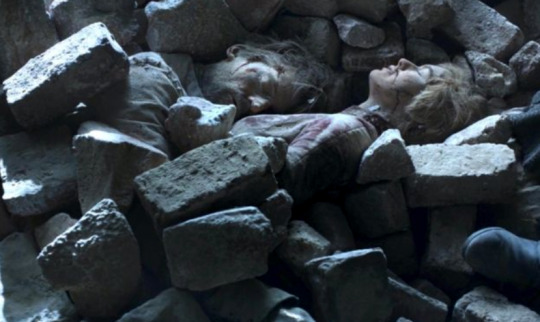
Observe the way Jaime and Cersei are orchestrated here. Despite being crushed by an onslaught of incredibly heavy stones and rocks, they are pictured here in peaceful and reverent positions - something akin to a Renaissance painting. How does that make you feel when you look upon it? The gentle, diffused white light, the atmosphere of ecclesiastical reflection - it is romantic, is it not? It is showing a glorified ideal! Behold the profundity of the nothingness!
Do you see what I mean? There is this glorification of showing the meaninglessness of life, of uncovering “the truth” that this life is full of ugliness and pain, of unmasking our delusions, of showing that there is always “someone behind the curtain”, our idols become monsters, our heroes become villains, it was all a lie, it was all a sick cosmic joke - and this is what empowers us and makes us wise. Oh, look how discerning and insightful we are as we reflect back to you the despair of a twisted humanity!
Me to Writers about how they believe their cynical worldviews are working in their stories:
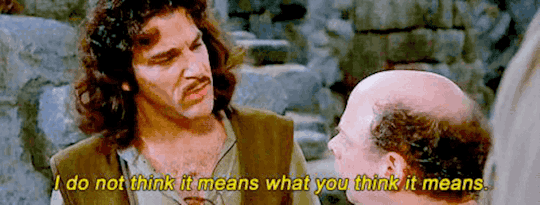
Now, I am not at all saying that stories cannot speak to the ugliness of this world, because there is truth in ugliness. There is pain, suffering, dread, brokenness, disillusionment, bitterness, anger, hate, and a myriad of dark and terrible things. I am not saying we should only tell feel-good stories where everyone lives “happily ever after”. No, what I am pointing out is an attitude that many storytellers have towards that ugliness. All artists have an obligation to speak to all truth, but there is huge difference between telling a story about ugliness vs making making that ugliness seem romantic. There is a difference between showing how life feels arbitrary and meaningless vs saying life is meaningless and arbitrary. There is such a big gap there.
So, I speak to all storytellers now: you are not profound for making statements about the despair of reality. You are not wise. You are not enlightened. It is easy for anyone to despair. It is much more difficult to rejoice in the face of that despair. It is easy to grow in bitterness and disappointment, much more difficult to believe in hope in the face of that disappointment. It is easy to observe ugliness, much more difficult to discern the beauty underneath, within, and despite it. And so that is what it really comes down to – it is easy to write a story like Daenerys “Mad Queen” Targaryen. It is easy to have her twist her own ideals and dreams into the dying screams of a burning city. It is easy to tell a story where someone falls than it is to tell a convincing and realistic story of redemption. It doesn’t require any work – nihilism is the lazy man’s philosophy. If all is meaningless, if nothing truly has any value, than that means you hold no responsibility to anyone or anything. It means you do not have to change the way you are doing things, that you can coast, lay back, and just watch the world burn. You can pat yourself on the back for being “woke” and not falling for the opiates of the masses. You don’t have to do any soul searching. You do not have analyze your own world view or assumptions. You don’t have to work at trying to understand what life truly means or try to find the purpose amidst all the chaos. There is no truth except the truth of nothing, therefore you are free to do nothing without guilt or shame. Nihilism is one big fat existential cop out!
Therefore, I say to all artists, storytellers, writers, showrunners, and creators – stop dishing out this crap for audiences to eat and get off your lazy asses and get to work!
26 notes
·
View notes
Text
Spoilers for The Handmaid’s Tale, “Offred” (1.01) through “Late” (1.03).
.
Here’s a secret: Dystopian worlds are beautiful. They are beautiful for the very same reason that they are horrifying -- for the intentionality and orderliness of their world, the way each object feels designed and each life circumscribed, so much more so than our own world. This is also what makes them feel foreign from our world, where we suffer from brutality that feels painfully random. Our tragedies are senseless.
We don’t know how fortunate we are. We don’t realize how much worse it could be for pain to be purposeful, for sacrifices to be involuntary, for lives to be instrumentalized.
In the Hulu adaptation, the order of Gilead is literally reflected in the visual language of the show; In contrast to the impressionist feel of Offred’s flashbacks, the wide shots of Gilead are symmetrical and well-composed (The Observer). The colors are bright and the contrasts stark. The look of the supermarket particularly struck me: The design was clean and simple, the objects that were of a kind identical with one another, the displays entirely free of the clutter of bodegas or discount shops. It’s not unlike the sort of expensive, urban market that stocks kefir and kombucha.
The show is beautiful -- and the beauty we find in its aesthetic should give us pause. There’s a part of us that yearns for this.

Photo from The Observer.

Photo from @qilliananderson
.
Many observers have drawn a connection between the plot of The Handmaid’s Tale and the Oklahoma legislator who called pregnant women “hosts.” But that thought is not quite complete. The idea is that women are hosts -- or they are mothers. They are whores in red -- or they are saints, in the blue of the Virgin Mary, of the cult of domesticity, of motherly generosity and benevolence.

“Mothers” in blue: Serena Joy, of The Handmaid’s Tale; Daenerys Targaryen, of Game of Thrones; Betty Draper, of Mad Men.
Comments about the show’s contemporary relevance has focused on the forced conception of children, because of its parallels to access to abortion and contraception in the United States. But this gets only at half the horror of Gilead, a world where whores and virgins; sexuality and reproduction; birth and motherhood are neatly partitioned.
The handmaids’ is a double trauma: of being forced to have children, and of having your children taken away from you. Offred’s daughter was taken from her so that she could bear children for others. As becomes apparent throughout the episode, many of the handmaids were already mothers in their old lives-- as we find out in Birth Day (1.02) and Late (1.03), Ofwarren and Ofglen both had sons, even younger than Offred’s Hannah. Perhaps they were targeted exactly because they had recently borne viable children when the vast majority could not. And the children that the handmaids do eventually bear are quite literally torn from their breasts. They cannot be both mothers and hosts.
Here, there are echoes in our world, too: the exploitative potential of surrogacy, which that was only just becoming possible when Atwood penned The Handmaid’s Tale; our own very recent history of policing who was entitled to the hallowed space of motherhood (an issue with broader awareness in Atwood’s native Canada than in the States); present-day critiques of transnational and transracial adoptions. In our world, these impulses to disentangle motherhood from that which makes it possible may be driven by economic incentive rather than law, guilt rather than guns, but they are there nevertheless.
.
I don’t actually think The Handmaid’s Tale is a vision of our future. This may be the vice president’s preferred future, but his brand of conservatism is on the downswing. Our country polices the conception and birth of children, yes, but not so nearly as much as it does the smuggling of children across borders, the innocence and killability of black and brown children, and the threat that the future will be populated with “somebody else’s” children.
Rather, The Handmaid’s Tale is more powerful when read allegorically than as a literal possible future. I inhaled Margaret Atwood as a teenager, and what always struck me about her writing -- whether it was The Handmaid’s Tale or her sci fi MaddAddam trilogy or Ferrante-esque story of an aging lady artist, Cat’s Eye --was her keen understanding of power. All dystopians are orderly, but the way in which Atwood’s world partitions people and the aspects of human life feel terrifyingly intuitive; almost familiar.
Most dystopian authors impose their blueprints on a blank slate. Huxley’s fetuses are literally tabula rasas conditioned to become who they are meant to be. They build their worlds as if there had been nothing before. Atwood works with the world as it exists; with what we already know, whether we know that we know it or not. As she’s noted in many interviews, she’s used no detail in The Handmaid’s Tale that had not already happened in the catastrophe of history. But more than that, she draws from her blueprints from the ones we already follow without intending to, from what we already know from our efforts to unlearn. She makes text of subtext.
I read The Handmaid’s Tale at fourteen, before I knew that rape and sexual assault had more to do with power than with sex. I read about wives and handmaids before I could properly describe the the virgin/whore dichotomy. And yet, I understood bone-deep why Gilead was designed the way it was; why a patriarchal power system would need to seize the means of reproduction; why it would feel compelled to pull apart a woman at the joints between sex and motherhood. We all do, and have since long before we had the language to say so.
The point is not to reveal the future towards which we are inevitably tumblng. Rather, The Handmaid’s Tale is a kind of reductio ad absurdum disproof -- a way of drawing our biases to their logical conclusion, of externalizing our deepest impulses so we can turn them around in our hands, of showing us the total horror of what was always inside of us. Gilead is not a crystal ball. It’s a mirror.
11 notes
·
View notes